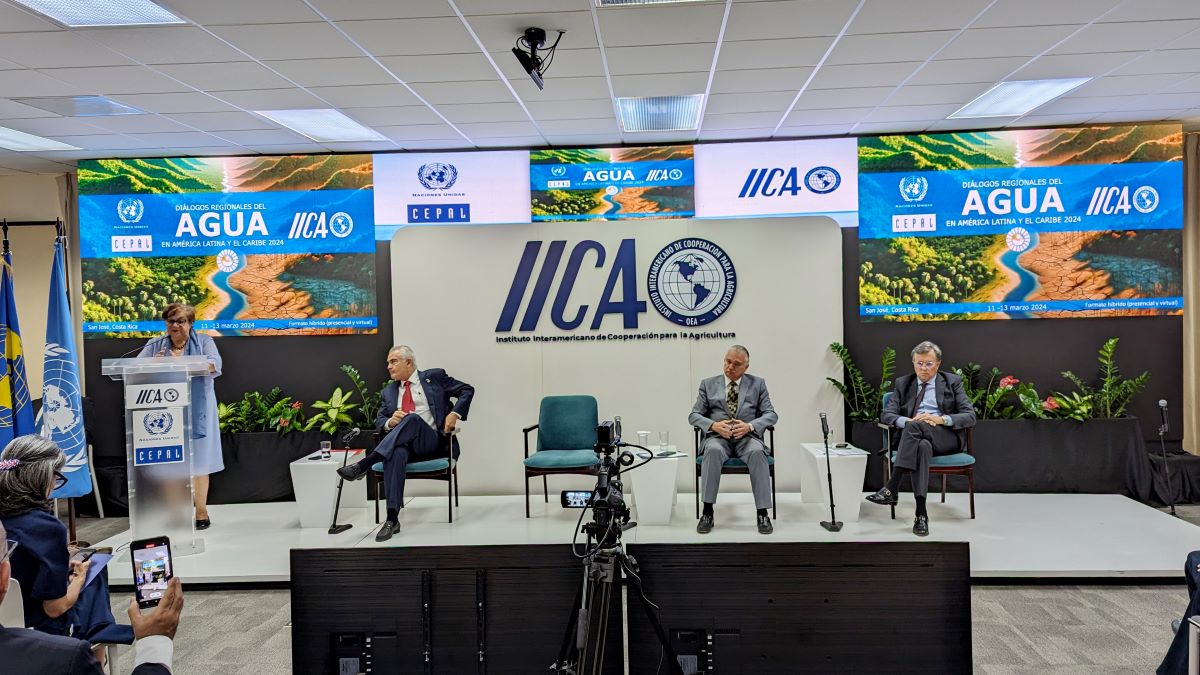This high-level event is organized by ECLAC and IICA in a hybrid format (combining in-person and virtual participation), combining high-level ministerial debates with a space for the exchange of successful experiences and lessons learned, with the aim of promoting good practices for water conservation and management.

San José, 12 March 2024 – (IICA) – The Economic Commission for Latin America and the Caribbean (ECLAC) and the Inter-American Institute for Cooperation on Agriculture (IICA) officially opened in Costa Rica the fourth edition of the Regional Water Dialogues in Latin America and the Caribbean, with a strong call to reduce the gaps in access to water and sanitation that harm vulnerable communities.
This high-level event is organized by ECLAC and IICA in a hybrid format (combining in-person and virtual participation), combining high-level ministerial debates with a space for the exchange of successful experiences and lessons learned, with the aim of promoting good practices for water conservation and management.
Ministers, vice ministers and other high-level authorities of national governments, representatives of international organizations and members of the private sector, academia and civil society will participate in the Dialogues.
The objective is to promote innovation and mobilize cooperation and financing, in addition to replicating, scaling up and providing concrete solutions for the water transition. In addition, the event will analyze regional progress in achieving Sustainable Development Goal 6 (SDG6), whose aim is to ensure the availability and sustainable management of water and sanitation for all.
This edition will also include a special session on water and agriculture, as well as a space for discussing and analyzing the Summary Regional Position Report, which the countries of the Americas and the Caribbean intend to present jointly at the 2024 World Water Forum, to be held next May in Indonesia. The document summarizes the main challenges and action proposals to address water challenges in the region.
The speakers at the opening ceremony were José Manuel Salazar-Xirinachs, Executive Secretary of ECLAC; Doris Gutiérrez, Vice President of Honduras, the country that holds the Presidency Pro Tempore of CELAC; Arnoldo André Tinoco, Minister of Foreign Affairs of Costa Rica; and Manuel Otero, Director General of IICA.
Guaranteeing the human right to water
“It is a pleasure to be at the Home of Sustainable Agriculture of the Americas,” said Salazar- Xirinachs, to express the importance of IICA as the host of these Dialogues, which he described as an opportunity to discuss the challenges facing the region to guarantee the human right to water, as well as to ensure an efficient management of a resource that has become scarce in recent years.
“In Latin America and the Caribbean, two out of ten people still do not have access to safely managed drinking water, and five out of ten do not have proper sanitation. Furthermore, access to water reflects the structural inequalities of the region, since the lowest income quintile has 25% less access to drinking water than the highest income quintile,” explained the Executive Secretary of ECLAC.
Salazar-Xirinachs went on to explain that, in order to safely universalize water and sanitation coverage for the population by 2030 in Latin America and the Caribbean, countries should invest, on average, 1.3% of their Gross Domestic Product (GDP) annually and steadily for a decade.
Otero, for his part, began by mentioning the importance of the alliance built by IICA and ECLAC. “We have a strong roadmap with clearly identified objectives, where water occupies a central place,” he said.
The Director General of IICA referred to the transformation process that is underway in the continent’s agriculture, which is a result of farmers’ newfound awareness of the changes they must make with the incorporation of technology and innovation.
“Water –he stressed– is a priority that the Ministers of Agriculture of the Americas have included in IICA’s technical cooperation strategy and, above all, in different alliances. This is the time to act if we are to reverse the problems that limit sustainable development. At IICA, we reiterate our commitment to acting, building consensus and, hopefully, to bringing well-being to rural areas and strengthening the links with urban centers.”
Doris Gutiérrez praised IICA for its commitment to sustainable development and the incorporation of new technologies in agriculture.
“I would like to congratulate IICA for this new approach to sustainable development, to an agriculture based on our own resources, and to technology that reaches rural men and women. I have worked with different rural communities and have learned that water is the most important driver. In these communities, women would get up at 1 o’clock in the morning to stand in line and wait for the well to fill. The best managers and administrators of water are, without a doubt, women,” she stated.
“We have policies, but the policies must be from the bottom up, with the participation of the most affected individuals, who must be involved from the very beginning,” said the Vice President of Honduras.
Minister of Foreign Affairs Tinoco drew attention to the region’s vulnerability in relation to climate change and water crises. “That is why it is imperative –he stated– that we work to manage and reduce the risks associated with natural phenomena by strengthening our early warning, response, mitigation, adaptation and rehabilitation systems in the face of water-related disasters.”
Tinoco warned that the necessary actions require sustainable financing sources, which is why it is essential to explore the funds available at the multilateral level. “Furthermore –he concluded– we must use South-South and triangular cooperation approaches. Despite the challenges we face, I am confident that these Dialogues will allow us to reach consensus and develop ideas and projects that will drive Latin America and the Caribbean towards equitable, inclusive and resilient development.”
More information:
Institutional Communication Division.
comunicacion.institucional@iica.int











